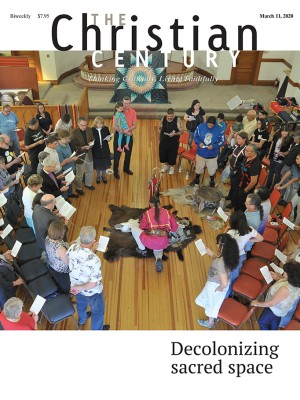
My first piano lesson involved learning notes on the page and their location on the keyboard. Hand position. Posture. By the second or third lesson I was punching out the notes to “Merrily We Roll Along.” I stuck with piano long enough to move beyond quarter, half, and whole notes. I learned a couple of keys. Or at least I learned that there were keys and that this thing called a circle of fifths gave shape to the different key signatures.
I topped out at the first two pages of Für Elise. I committed them to memory and, impressed with myself, began to play only that much. I played it fast and happy, slow and sad, lower on the keyboard and then higher. My middle-school keyboard teacher was not impressed. She watched as I plucked out the left hand, then the right, then slowly combined them, and then stopped when the notes on the third page gave me no place to hide.
Read our latest issue or browse back issues.
My little charade didn’t last long. Even I knew I was cheating, abusing the notes written with such care. But what if a community of people had gathered around my two-page version of Für Elise? What if, without knowing anything about the notes on those pages or on the ones that followed, they had been moved by it?
There is a danger in oversimplifying, in taking an idea and giving just a sense of it, debarbed and rubbed clean of contestation and complexity so thoroughly that those who hear it think they know all they need to know. In pulpits, in Sunday school, on social media—the nuance of a thing can get digested into easily repeated lines, which can then shape lives, institutions, and nations.
Such lessons can be taught early. They can seem natural, divinely ordered. Don’t touch. The Bible says. God is in control. Christian life becomes a list of affirmations and refusals. Salvation becomes a prayer whispered in a desperate moment to unlock eternal life.
My own beginnings of faith were seeded by these certainties, planted by people I respected whose answers to my questions helped me make sense of the world. The ease of being able to name good and evil, faithfulness and unfaithfulness, gave me direction. These claims were like the foundation of a house. And when I was confronted with inconsistencies of scripture or histories of doctrine or genealogies of race, I was afraid—because I knew how much had been built up upon those smooth concrete slabs.
The intro theology courses I teach are filled with the refugees and exiles of these simple answers. They asked too many questions or found their bodies didn’t fit within their understanding of what faithfulness looked like. They saw more evil within the church than outside it. They looked at the world and wondered aloud if God was in control.
At every turn we have the opportunity to be confronted by the mingling of joy and pain, good intentions and ill means. Our everyday experience inundates us with complexity. I suppose this is why simplicity is so comforting. In our bones we know that the world, God, and our very selves are present yet unknowable.
Maybe this is the heart of so much human violence—clinging to ideas that can only be true if the presence of certain people is excised and rendered untrue. We gather around the simple versions of tunes that seem to bring us comfort, all the while pretending that life is the tune itself and not the theory, the notes, the life attuned and practiced upon an instrument.
In the face of this, what do we teach? What do we sing or pray? Where do we begin?
There is a long Christian tradition of divine simplicity, that God “is what he has.” God is not complex, the thinking goes, because God cannot be reduced. There is a residue of this idea in so much of American Christianity. The idea of God’s simplicity gets boiled down to claims about an immovable divine nature or will—claims that in turn become the basis of essentialist, unchanging ideas about what certain people are (or are not). It’s an appeal to an eternal, unbending truth that seems to always become incarnate in social systems and everyday lives.
But what if we began instead with the assumption that there is multiplicity in every moment? There are always the many, and living means attending carefully to the differences between them. This can be scary; it requires more than a book or a lesson. Seeing God’s life as complex movement—as a song I was created to live within and to become—means the totality of my life will speak and I can only hope it resonates in the lives of those I meet.
Maybe this is what we mean when we say God is love.
Our existence as music is not notes on a page but reverberating tones.
Rather than a statement of rest, perhaps divine simplicity is a claim of utter entanglement, a nest, a knot, strings bending and tucking and twisting until we do not know which end is which.
I wonder if we could begin to inhabit a God that exists as this movement, and that calls us to see simple lessons only as a place to begin—as an invitation to feel the complexity of every moment, the contradictions of our own lives, the overlapping histories that we are wrapped within. If so we might begin to discover more words to describe our worlds, take notice of the subtleties that line our paths, and create spaces where all might more truthfully worship and live.
A version of this article appears in the print edition under the title “God’s complex music.”




